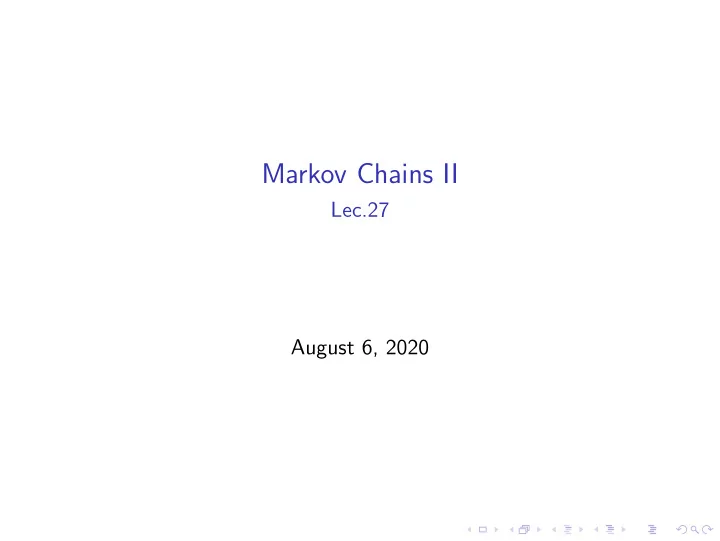

Markov Chains II Lec.27 August 6, 2020
Invariant Distribution Recap A distribution π is invariant for the transition probability matrix P if it satisfies the following balance equations : π = π P (1)
Classification of States 1. A state i is recurrent if starting from i , no matter what path we take, we can always return to i 2. A state i is transient if starting from i , there exists a path for which there is no way back to i 3. A class of states is a set of states where it is possible to get from any state to any other state
Irreducibility Definition A Markov chain is irreducible if it can go from every state i to every other state j , possibly in multiple steps.
Irreducibility Example
LLN for Markov Chains For an irreducible Markov Chain, we have that: 1. The chain has a unique invariant distribution π = [ π (1) . . . π ( n )]. 2. For each j ∈ X , P n m =0 1 { X m = j } lim = π ( j ) n n →∞ . This holds regardless of what particular π 0 we use.
Periodicity Definition Consider an irreducible Markov chain on X with transition probability matrix P . Define d ( i ) := g.c.d { n > 0 | P n ( i , i ) = Pr [ X n = i | X 0 = i ] > 0 } , i ∈ X . 1. Then, d ( i ) has the same value for all i ∈ X . If that value is 1, the Markov chain is said to be aperiodic . Otherwise, it is said to be periodic with period d . 2. If the Markov chain is aperiodic, then Pr [ X n = i ] → π ( i ) , ∀ i ∈ X , as n → ∞ . (2) where π is the unique invariant distribution. For a given state i , the quantity d ( i ) is the greatest common divisor or all the integers n > 0 so that the Markov chain can go from state i to state i in n steps.
Periodicity Example
Key Points 1. If a Markov chain is irreducible, it has a unique stationary distribution but does not necessarily converge to it 2. Periodicity is not defined for reducible Markov chains 3. If a Markov chain contains a self-loop, it is aperiodic. If there isn’t a self-loop, it may or may not be aperiodic 4. If a Markov chain is irreducible and aperiodic, then it converges to a unique invariant distribution regardless of the initial distribution π 0
Recommend
More recommend